IELTS Letter Writing – Formal & Informal Tone
IELTS letter writing seems easy, but without a consistent tone, your Task Achievement score will be 6 or lower.
This lesson will ensure that your score can increase to a band 7 and higher.
Specifically, you’ll learn what tone is, how to use it and how to improve your own ability to use it accurately.

Contents:
- What is Tone?
- General Guidelines for the IELTS Letter Writing
- Cohesive Devices for IELTS Letter Writing
- Grammar for IELTS Letter Writing
- Vocabulary for IELTS Letter Writing
- Sample Answers for IELTS Letter Writing
What is Tone?
To have the appropriate tone for IELTS General letter writing, we must write in a formal or informal style.
The reason that tone is important is that it affects what people think about us.
We use formal language if we want people to think that we’re intelligent, respectful, serious, knowledgeable or dependable.
If we want people to think that we’re friendly, fun, relaxed or outgoing, we use informal language.

So, for example, we normally use informal language with our friends, but if we need to discuss something serious, we will use formal language instead.
Similarly, we normally use formal language with our employer, but if we’re at a work party, we would use informal language.
To adjust the tone of the language, different vocabulary and grammar must be used.
You can also see how Cambridge describes formal and informal language here.
General Guidelines for the IELTS Letter Writing
Which Tone to Use for IELTS General Letter Writing
When the question says to write a letter to a friend, like the one below, we use an informal tone.
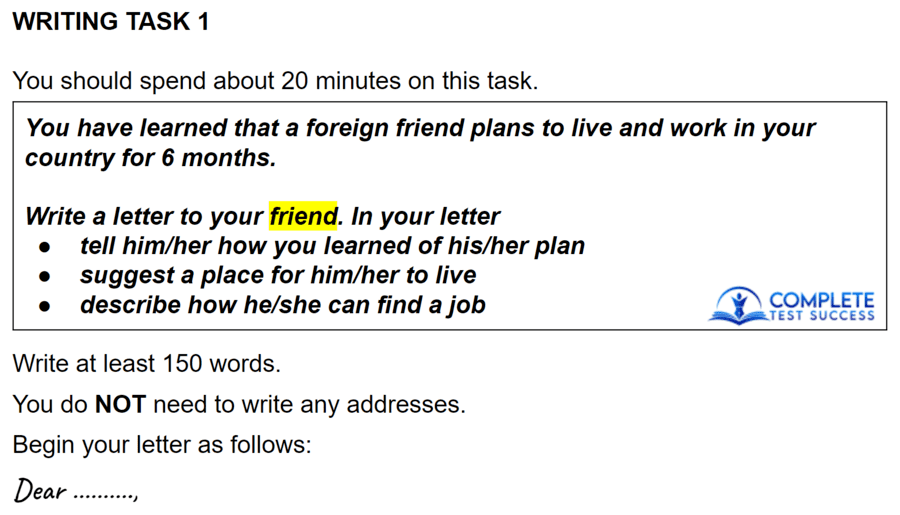
When we’re writing a letter to anyone else, we use a formal tone.
For IELTS letter writing, there’s no need to worry about semi-formal language as formal and informal is enough to meet the examiner’s requirements.
Not Too Informal
When we are sending messages to our friends, we often use shortened versions of a word like ‘pls’ instead of ‘please’ or ‘OK’ instead of ‘okay’.
However, you don’t want to do this for IELTS letter writing. Remember, it’s still a test of your English, so you need to show what you’re capable of.

Also, you should use complete grammatical structures.
Saying something like, “You going?” isn’t acceptable, and you need to use the full structure, “Are you going?”
Idioms
Don’t use idioms in IELTS general letter writing as they will reduce your score.
Idioms are quite old fashioned and are rarely used in modern English.
Also, the circumstances in when they are appropriate are very rare, which means that even if you know what an idiom means, it will normally be inappropriate to use it.

Abbreviations
Don’t use abbreviations like e.g. or etc.
Cohesive Devices for IELTS Letter Writing
As you’re likely aware, you need to use cohesive devices to get a high Coherence and Cohesion score in Task 1.
Cohesive devices tend not to be informal and are mostly formal or neutral.
The formal ones should only be used in formal letters, but the neutral ones are okay for both formal or informal letters.
Strangely, the tone of these words isn’t labelled in any of the most reliable dictionaries, so you can use the list below to help you determine which ones are suitable for your Task 1 answer.

However, word lists are not a good way to learn new vocabulary so just use this list to help you learn about the tone of the cohesive devices you already know.
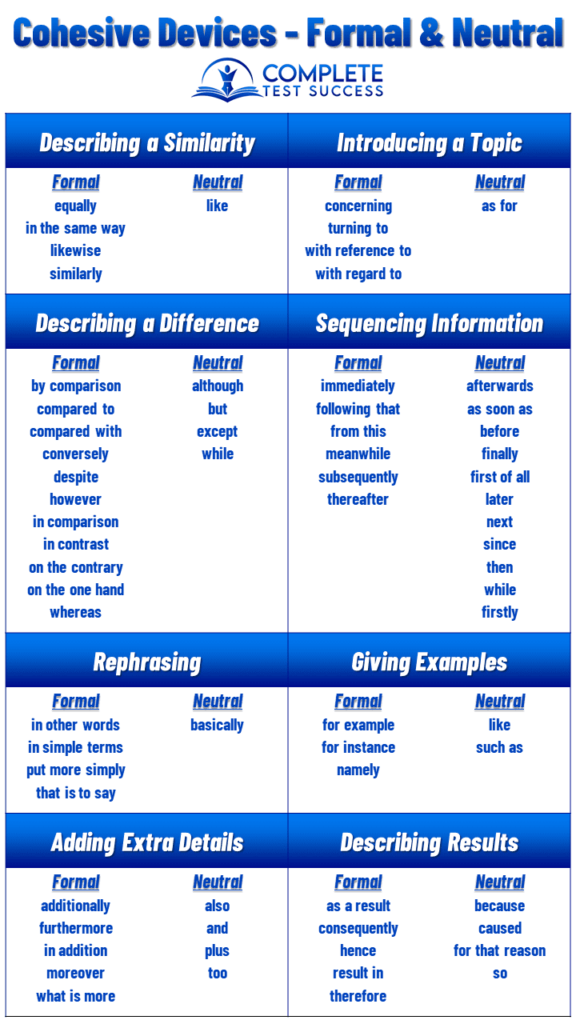
As you may have noticed from the above image, formal cohesive devices are often longer than neutral ones.
If you’d like a pdf download of the above cohesive devices, you’ll get these, as well as sample questions and answers, when you sign up for my newsletter.
Grammar for IELTS Letter Writing
In this part of the lesson, we are looking at how different grammatical structures can affect the tone of your writing.
However, if you don’t have a firm grasp of English grammar already, you should focus on that first.
As grammar in Task 1 is scored the same way as Task 2, my grammar lesson will show you how the examiner decides and how to improve your score.
The Length of the Structures
In general, longer grammar structures are more formal.
For example;
Formal: I am afraid that I won’t be able to attend your party.
Informal: I can’t go to your party.

Being Direct
Also, informal structures tend to be more direct.
For example;
Formal: I think it would be a good idea if you started to do some regular exercise.
Informal: You should do more exercise.

Keep in mind, though, that being direct can be rude if you’re giving advice or asking for help.
Contractions
Contractions are considered to be less formal.
For example;
Formal: I am so sorry.
Informal: I’m so sorry.
This is something to keep in mind for your IELTS letter writing because we are making an effort to sound more formal or informal.
For Task 2, though, it’s acceptable to use contractions because modern English is less strict about this convention.
Modals
The use of modals is another way to sound more formal.
For example;
Formal: I would like to go home.
Informal: I want to go home.

Phrasal Verbs
Phrasal verbs are often more informal.
For example;
Formal: He arrived late to the party.
Informal: He turned up late to the party.
Passive Voice
Passive voice isn’t always formal, but it can be used to make a sentence sound more formal.
For example;
Formal: The house was bought for $1 million.
Informal: Someone bought the house for $1 million.

Vocabulary for IELTS Letter Writing
Neutral Tone
Firstly, it’s important to note that most vocabulary is neutral rather than formal or informal.
Let’s first look at an example from the Cambridge Dictionary.
Here, we see three words that can be used to describe food with a nice flavour.
However, as you can see in the image, only the word ‘yummy’ is marked as being informal.
The other two don’t say anything about the tone, which means that they are neutral.
These neutral words are suitable to use in both formal and informal situations.
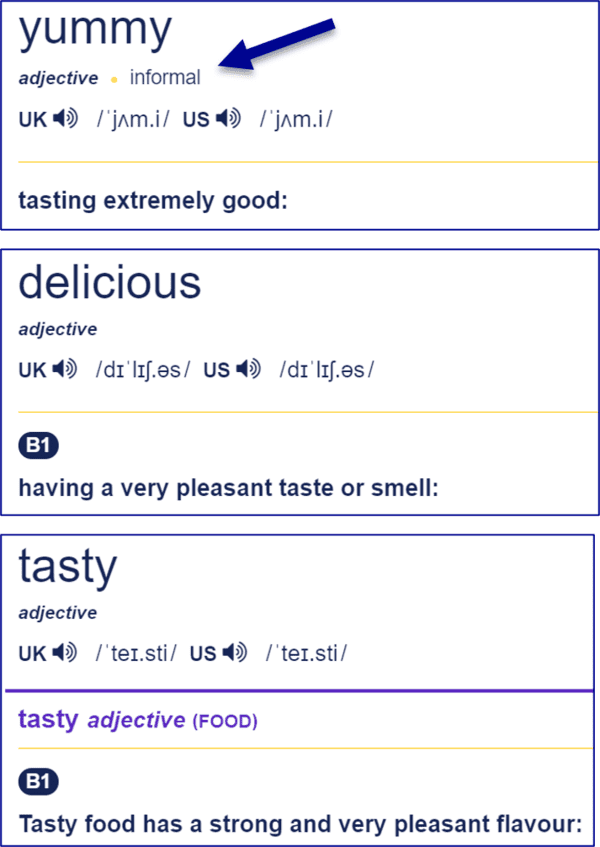
Vocabulary You Already Know
Unfortunately, most students don’t check if new words are formal, neutral or informal when studying vocabulary.
This means that you could potentially know thousands of English words already but don’t know which ones to use for formal and informal letters.
The only option now is to go back and relearn this aspect of the vocabulary you already know.
Of course, you can search every word in a dictionary, but that’s impractical because of how much time it would take.

An English Speaking Friend
A better option is to do some IELTS General letter writing and then ask an English-speaking friend to check the tone for you.
Online Resources
- An alternative is to use a site like HiNative where people from all over the world help each other with language learning.
With this option, however, you won’t be as confident that the feedback you get is reliable. - If you’re willing to pay money, an app called Wordtune gives you suggestions on how to make your writing sound more formal or informal.
This app won’t actually tell you which words are formal or informal, though; it just gives accurate suggestions on how to adjust the tone. - As you’ll see in my Lexical Resource lesson, I’m against using word lists to learn new vocabulary.
However, in this situation, they are a quick way to discover if words we already know are formal or informal.I have looked at all the most popular formal and informal vocabulary lists online and determined that these are the most reliable ones.
Free Live Feedback Lessons
You can also come to my free Live Feedback Lessons, where I will give you feedback on the tone of your writing.
Learning New Vocabulary
So how can you discover if any new vocabulary you learn is formal or informal?
In short, you need to check a dictionary and make a note of it in your vocabulary notebook.
For the full explanation, make sure you follow my Vocabulary Improvement Strategy.
However, you can also become better at recognising tone by noticing the intentions of the person speaking or writing.
Intentions
The intention of the speaker or writer is a good indication of what tone is being used.
For example, a news reporter wants to convey that their information is reliable, so they use a formal tone.

Magazines like National Geographic or Time want to show that they are reputable sources of information so use formal language.
However, magazines like J14, which are aimed at teenagers, want to be seen as fun and trendy, so use informal language.
The tone of the language used in a movie or TV show will depend on the situation and the relationship between the speakers.
Noticing the intentions of a speaker or writer in this way is important for improving your ability to use the appropriate tone in IELTS letter writing.
Warning
Don’t read classic literature!
Most of these books were written a long time ago, and the English language has changed a lot since then.
For example, the novel “Frankenstein” was written in 1817 and in the very first sentence, you will see the word ‘distinguished’.

However, the word ‘distinguished’ is not used as often anymore, as you can see in this image from Google Books.
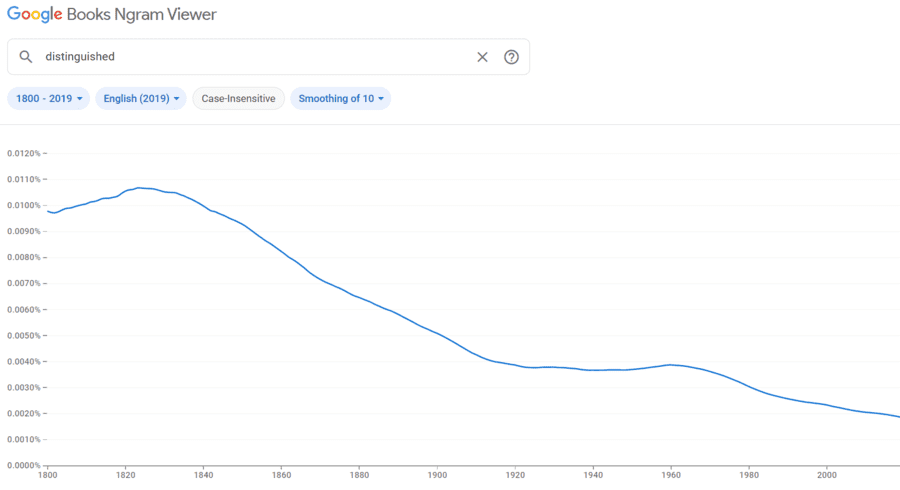
Sample Answers for IELTS Letter Writing
What we’ve looked at so far is how to adjust the tone of our writing.
Now, let’s see what it actually looks like.
Below are two letters with the exact same information, but the first is for the writer’s boss and the second for the writer’s friend.
Formal Sample Answer
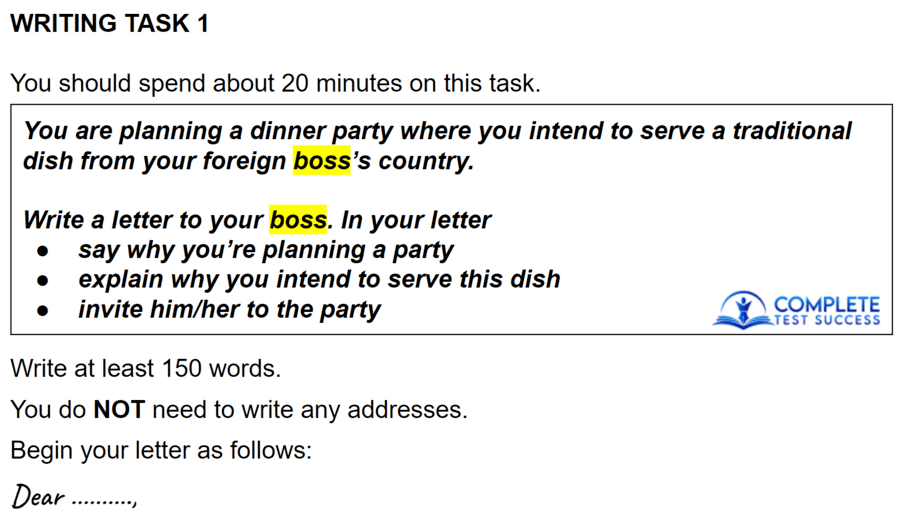
Dear Mrs Smith,
This Sunday, I am having a dinner party to mark my and my husband, John’s, 20th wedding anniversary. He is not aware that I am organising this party which means that it will be quite a big surprise for him. John immensely enjoys when we have guests, and because of this, I am quite confident that he will be very pleased when the guests arrive.
There will be cuisine from your country served as my husband is very fond of Nigerian dishes. Under normal circumstances, we don’t eat it very often, though, as it is quite challenging to get the right ingredients in this part of the world. Fortunately, however, I have been able to acquire all the necessary ingredients, and I am confident that John will enjoy the party all the more because of this.
I thought that it would be nice if you could come to the party as well since there will be some guests who I believe you would enjoy the company of. Dinner will be served at approximately 5 o’clock; however, it would be nice if you could come earlier and we can chat before the other guests arrive. Please let me know by Saturday if it is possible for you to attend because I would like to ensure that there is enough food for everyone.
Yours sincerely,
Jennifer O’Connell
Informal Sample Answer
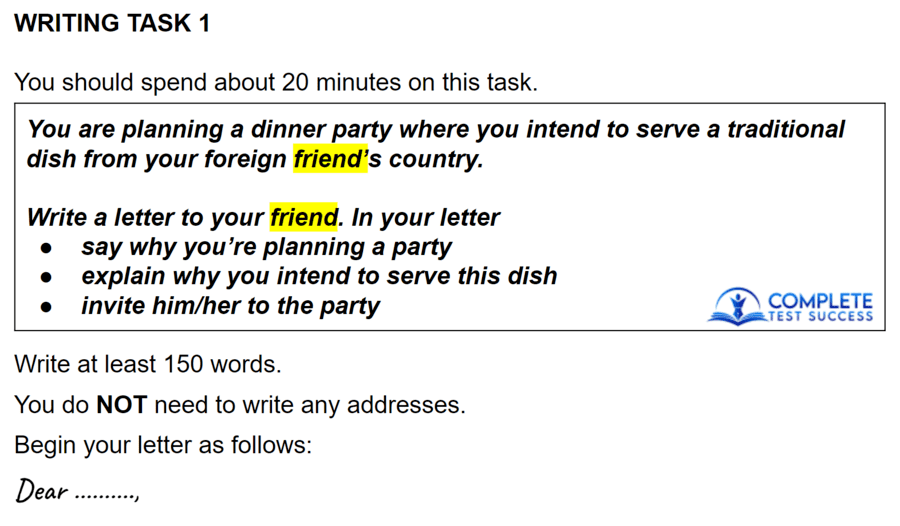
Dear Jane,
I’m throwing a dinner party on Sunday to celebrate 20 years of marriage with John. He doesn’t know that I am planning it, so that will be a big surprise for him. You know that he loves having visitors over to the house, so I’m pretty sure that he’ll be delighted when he sees all of the guests arriving.
We will have dishes from your country there because John is actually a massive fan of Nigerian food. We usually don’t eat it much because it’s just so tricky to get the right ingredients around here. Luckily, though, I was able to get everything I need already, and I know that this will make the party all the better for him.
I was hoping that you can come to the party too because there will be other people there that I think you will enjoy meeting. Dinner will be at about 5 o’clock but get here before that if you can, and we’ll hang out for a while before everyone else comes. Can you let me know by Saturday if you’ll be coming because I want to make sure that I cook enough food?
Best wishes,
Jenny
What now?
I’m sure this lesson has highlighted a lot of things you need to focus on for your IELTS test and if you ever need to review it, you can use this video.
However, make sure you understand how the examiner assesses IELTS letter writing with my Task 1 band scores explanation and how to write a letter with my Step by Step Strategy. Finally, you can compare your writing with my sample letters.
